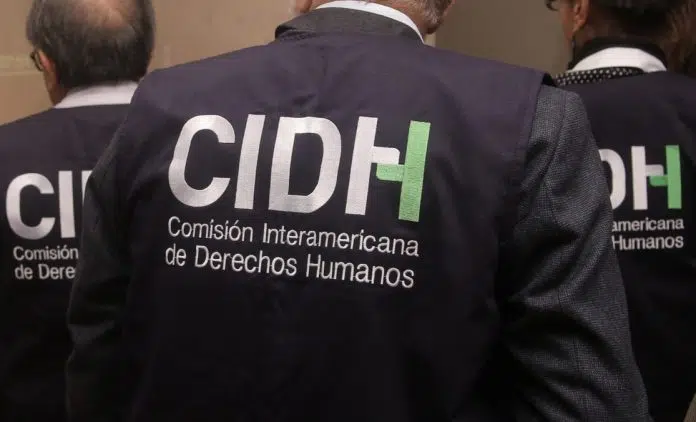The Inter-American Commission on Human Rights (IACHR) will examine on the merits the May 1, 2021, removal of the justices of the Constitutional Chamber of the Supreme Court of Justice of El Salvador, after the Legislative Assembly waived ordinary procedure.
The human rights organization Cristosal was notified that the IACHR will include this analysis in its Annual Report to the General Assembly of the Organization of American States (OAS), on the grounds that the events “constitute a direct threat to democracy and human rights.”
Cristosal supported the petition of justices Carlos Sergio Avilés Velásquez and Carlos Ernesto Sánchez Escobar, who alleged that they were unlawfully removed. Cristosal stated that on that day, the Executive seized control of the three branches of government, shattering judicial independence.
Constitutional lawyer Roxana Cardona noted that this is the third time the IACHR has issued a resolution concerning democratic backsliding in El Salvador, which is eroding the country’s image as a democratic state.
Cardona added that these resolutions set a precedent that the “State is a violator of human rights,” despite the State’s attempts to reinterpret the law.
For his part, attorney Otto Flores noted that there have been removals of other magistrates, referring to the case of the Tribunal Supremo Electoral (Supreme Electoral Tribunal, TSE). He also pointed out that rulings such as the 2019 Colindres Schonenberg case fail to establish the specific grounds on which a magistrate can be removed, nor is the proper legal process defined to guarantee the right to a defense, due process, or review.
Flores indicates that the case establishes that the Assembly must be more specific when deciding on a removal. The newly installed Assembly was not prepared to carry out the removal of the justices.
Cristosal stated that the IACHR’s decision to add this analysis to its annual report “opens the door to reviewing the system of checks and balances in El Salvador,” as well as the lack of controls on the arbitrary exercise of power by the Executive branch.
Análisis de CIDH sobre destitución de magistrados deja precedente de que el Estado es violador de derechos humanos
La Comisión Interamericana de Derechos Humanos (CIDH) analizará de fondo el caso de la destitución de los magistrados de la Sala de lo Constitucional de la Corte Suprema de Justicia de El Salvador, el 1 de mayo de 2021, con dispensa de trámite por la Asamblea Legislativa.
La organización defensora de derechos humanos, Cristosal, fue notificada que la CIDH incluirá el análisis en el Informe Anual de la Asamblea General de la Organización de Estados Americanos (OEA), debido a que los hechos “constituyen una amenaza directa a la democracia y a los derechos humanos”.
Cristosal acompañó la demanda de los magistrados Carlos Sergio Avilés Velásquez y Carlos Ernesto Sánchez Escobar, quienes denunciaron que fueron destituidos de forma irregular. Cristosal señaló que ese día el Ejecutivo se apoderó de los tres poderes del Estado, quebrantando la independencia judicial.
La abogada constitucionalista, Roxana Cardona, señaló que es la tercera vez que la CIDH emite una resolución sobre quiebres democráticos en El Salvador. Lo que estaría mermando su imagen de Estado democrático.
Cardona señala que con estas resoluciones se establece un precedente de que el “Estado es un violador de derechos humanos”, pese a que de parte del Estado se reinterprete la ley.
Por su parte, el abogado Otto Flores señaló que ha habido destituciones de otros magistrados, refiriéndose al caso del Tribunal Supremo Electoral (TSE). También en resoluciones como el caso Colindres Schonenberg 2019, no se establecen motivos específicos por los cuales un magistrado puede ser destituido o cuál es el proceso legal adecuado para garantizar el derecho de defensa, el debido proceso o una revisión.
Flores indica que en ese caso se establece que la Asamblea debe ser más específica para decidir la destitución. La Asamblea que recién ingresaba no estaba preparada para realizar la destitución de los magistrados.
Cristosal señaló que la decisión de la CIDH de agregar este análisis a su informe anual “abre la puerta a revisar el sistema de pesos y contrapesos en El Salvador” además de la falta de controles frente al ejercicio arbitrario del Ejecutivo.

